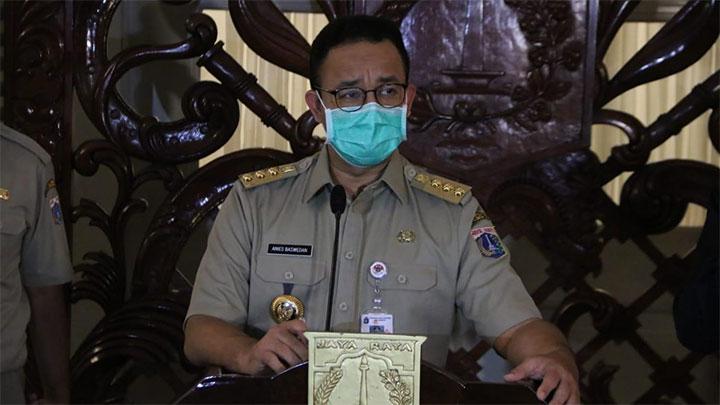Following the extension of PPKM until 1st November, DKI Jakarta Governor Anies Baswedan has issued Governor’s Decree no. 1245 of 2021 concerning the implementation of level 2 COVID-19 restrictions.
This policy is also a follow-up to the implementation of the instruction of the Home Affairs Minister number 53 of 2021 concerning the enforcement of restrictions on community activities for levels 1-3 in Java and Bali.
In the decree, it states that during the PPKM level 2, everyone who carries out activities in each sector or place must have been vaccinated against COVID-19, with at least the first dose.
Exceptions are given for residents who are still within a three-month period after being infected by COVID-19 with evidence of laboratory results, those who are unable to be vaccinated based on the results of a medical examination with evidence of a doctor’s certificate, and children aged less than 12 years.
For people who have been vaccinated, they can show proof of their status as being vaccinated on the Jakarta Kini (JAKI) application, the vaccination certificate contained in the PeduliLindungi application, or proof of vaccination issued by an authorised institution.
Here are the complete rules for PPKM level 2 in Jakarta:
1. Activities at offices
– Non-essential sector:
50 percent work from an office (WFO) for employees who have been vaccinated; they are required to use the PeduliLindungi application at the entrance and exit of the workplace.
– Essential sectors:
a. Finance and banking only includes insurance, banks, pawnshops, future exchanges, pension funds, and financial institutions that are oriented to physical services with customers;
– For letter a, those places can operate with a maximum capacity of 75 percent of staff for locations related to services to the community, as well as 50 percent for office administration services to support operations and with the implementation of health protocols comprehensively.
b. Capital markets which are oriented towards customer service and goods capital market operations;
c. Information and communication technology includes cellular operators, data centres, internet, postal services, media related to the dissemination of information to the public;
– For letters b and c, they can operate with a maximum capacity of 75 percent of staff and with stricter implementation of health protocols;
d. Non-quarantine handling hotels:
– For letter d, these places can operate with more stringent application of health protocols with the following conditions:
(a) Mandatory use of PeduliLindungi application to screen all employees and visitors;
(b) Maximum capacity of 50 percent and only visitors with green and yellow categories in the PeduliLindungi application may enter;
(c) Fitness centres, gym facilities, meeting rooms, and large-capacity meeting rooms, and ballrooms are permitted to open using the PeduliLindungi application with a maximum capacity of 50 percent, as well as the provision of food and beverages in large facilities or ballrooms served in boxes and no buffet; and
(d) Visitors under the age of 12 years must show a negative result of a 24-hour antigen or a 48-hour PCR test.
e. Export-oriented and supporting industries in which the company must show evidence of sample documents for Notification of Export of Goods (PEB) for the last 12 months or other documents showing export plans and are required to have an Operational Permit and Mobility of Industrial Activities (IOMKI) with due regard to regulations from the Industry Ministry.
They can operate with the implementation of a more stringent health protocol with the following conditions:
(a) can only operate with shift arrangements with a maximum capacity of 75 percent of staff only in production facilities or factories;
(b) 50 percent for office administration services to support operations;
(c) must use the PeduliLindungi application for entry and exit arrangements; and
(d) employees cannot eat together.
– Essential sectors in the government sector follow the technical provisions issued by the Empowerment of State Apparatus and Bureaucratic Reform Ministry;
– Critical sectors:
a. health; b. security and order; c. disaster management; d. energy; e. logistics, post, transportation, and distribution especially for the basic needs of the community; f. food and drink and their supporting equipment, including for livestock/pets; g. fertilisers and petrochemicals; h. cement and building materials; i. national vital objects, j. national strategic projects; k. construction (public infrastructure including telecommunications and broadcasting infrastructure); and l. basic utilities (electricity, water, and waste management);
Can operate with stricter implementation of health protocols, with the following conditions:
1. Letters (a) and (b) can operate at 100 percent without any exceptions.
2. Letters (c) to (l) can operate at 100 percent of staff, only at production or construction facilities or services to the community. For office administration services to support operations, a maximum of 50 percent is applied;
3. Companies that are included in the sector in letter (d), (e), (f), (g), (h), (k), (l) are required to use the PeduliLindungi application to screen all employees and visitors who enter production, construction, and/or service facilities and office administration areas;
4. Companies that are included in the sector category letter (c) are required to obtain a recommendation from the technical ministry of sector guidance before they can gain access to use the PeduliLindungi application.
2. Teaching and Learning Activities
– Educational facilities:
The implementation of learning in educational facilities can be carried out through limited face-to-face learning and/or distance learning based on the Joint Decree of the Ministers of Education and Culture, Religion, Health and Home Affairs numbers 03/KB/2021, 384 of 2021, HK. 01.08/MENKES/4242/2021, and 440-717 of 2021. Face-to-face learning is therefore limited to a maximum capacity of 50 percent.
(a). SDLB, MILB, SMPLB, SMALB, and MALB have a maximum of 62 to 100 percent by maintaining a minimum distance of 1.5 m and a maximum of five students per grade per class; and
(b). PAUD has a maximum of 33 percent by maintaining a minimum distance of 1.5 m and a maximum of five students per class.
3. Activities in the sector of the daily need
a. Supermarkets, hypermarkets, traditional markets, grocery stores, and supermarkets selling daily necessities are to operate until 9pm, with a visitor capacity of 75 percent and with the implementation of more stringent health protocols, especially for wholesale markets. Furthermore, supermarkets and hypermarkets are required to use the PeduliLindungi application.
b. Pharmacies and drug stores can be open for 24 hours, with stricter implementation of health protocols.
c. Markets that sell non-daily necessities can operate with a maximum capacity of 75 percent and operating hours are limited to closing at 6pm, with stricter implementation of health protocols.
d. Street vendors, grocery stores, voucher agents/outlets, barbershops, salons, laundrettes, hawkers, small workshops, vehicle washes, and similar businesses are allowed to open until 9pm with stricter health protocol implementation.
4. Eating/drinking activities in public places
(a) Food stalls or warteg, street vendors, hawker stalls, and the like are allowed to open and receive dine-in customers until 9pm with a maximum capacity of 50 percent of the capacity and mealtime can be a maximum of 60 minutes with stricter implementation of health protocols.
(b) Restaurants and cafes with locations located in buildings, shops, or open areas either in separate locations or located in shopping centres are allowed to open with the following conditions:
a. Can receive dine-in with operating hours up to 9pm and with the implementation of strict health protocols;
b. Maximum capacity 50 percent;
c. Maximum meal time is 60 minutes; and
d. It is mandatory to use the PeduliLindungi application to screen all visitors and employees.
Restaurants and cafes with operating hours starting at night can operate with the following conditions:
(a). Can receive dine-in with operating hours at 6pm up to a maximum of midnight and with the implementation of strict health protocols;
(b). Maximum capacity 50 percent:
(c). Maximum meal time is 60 minutes; and
(d). It is mandatory to use the PeduliLindungi application to screen all visitors and employees.
5. Activities at shopping centres and trade centres:
1. Maximum capacity of 50 percent and operating hours until 9pm with due observance of the provisions in number (3) letter (a) and number (4) letter (b) and carried out with the health protocol regulated by the Trade Ministry;
2. Mandatory to use the PeduliLindungi application to screen all visitors and employees;
3. Visitors under the age of 12 years must be accompanied by their parents to enter;
4. Children’s playgrounds and entertainment venues are open on condition that parents must record their address and telephone number for tracing purposes;
5. Cinemas can operate under the following conditions:
a). Mandatory to use the PeduliLindungi application to screen all visitors and employees;
b). Maximum capacity of 70 percent and only visitors with green and yellow status in PeduliLindungi may enter;
c). Visitors under the age of 12 years must be accompanied by a parent;
d). Restaurants and cafes within the cinema area are permitted to accept dine-in with a maximum capacity of 50 percent for 60 minutes.
6. Construction activities
Construction sites for public infrastructure and private construction (construction sites and project sites) can operate at 100 percent with operating hours and capacity settings, with stricter implementation of health protocols.
7. Worship activities
Places of worship (mosques, prayer rooms, churches, temples, pagodas, and other places that function as places of worship) can hold congregational worship or religious activities during the PPKM level 2 with a maximum of 75 percent capacity or 75 people by implementing more stringent health protocols.
8. Activities at health service facilities
– Health care facilities can operate at 100 percent following stricter implementation of health protocols.
9. Activities in public areas and other places that can generate crowds
– Public facilities (public parks, public tourist attractions, and other public areas) are allowed to open with stricter implementation of health protocols with the following conditions:
(1) Operational hours up to 21.00 WIB;
(2) Maximum capacity of 25 percent
(3) Follow the health protocol regulated by the Health Ministry and/or related ministries and industries;
(4) Mandatory use of PeduliLindungi application to screen all visitors and employees;
(5) Children under the age of 12 years are allowed to enter tourist attractions that use the PeduliLindungi application provided that they are accompanied by their parents; and
(6) Odd-even policy along the road to and from tourist sites starting Friday at 12pm until Sunday at 6pm
– Wedding reception venues can hold a maximum of 50 percent of the room’s capacity and meals cannot be provided at the venue by implementing stricter health protocols.
– Locations for arts, culture, sports facilities, and social activities that can cause crowds are allowed to open with stricter implementation of health protocols, with the following conditions:
(1) Operational hours until 9pm
(2) Maximum capacity 50 percent
(3) It is mandatory to use the PeduliLindungi application to screen all visitors and employees
– Activities at fitness centres or gyms are allowed to open with stricter implementation of health protocols, with the following conditions:
(1) Operational hours until 9pm
(2) Maximum capacity of 50 percent
(3) It is mandatory to use the PeduliLindungi application to screen all visitors and employees
10. Activities on transportation
– Public vehicles, mass transportation, taxis (conventional and online), and rental vehicles can work at 100 percent capacity with stricter implementation of health protocols;
– Online motorcycle taxis are to follow a stricter implementation of health protocols.




